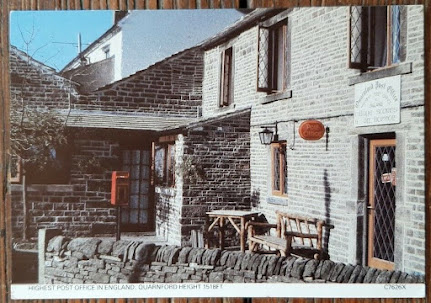At 463metres (1518 feet), Flash is the highest village in Great Britain. It is also home to the highest village pub, The New Inn. Just outside the village, The Flash Bar Stores is the highest shop in England and alongside is the former "Traveller's Rest" once the third highest pub in the country but now converted to holiday accommodation. The Post Office was also highest in the land as was the village post box.
Flash is in the parish of Quarnford which has a population of 242; much reduced from the 700 residents of the early 1800s. The parish name was first recorded in 1227 and perhaps refers to the Old English name for a millstone : a ‘cweorn’.
Agriculture was of course an important source of employment but so too was mining. Coal was first produced in 1401 and there were a number of pits in the area, mostly to the north of the village. The mines continued to be worked through the 18th and 19th centuries with the last mine closing in the 1930s.
A number of people were employed in the silk trade and in 1850 there were 34 people employed making buttons by hand. This trade continued into the 20th century.
St.Paul's Church dates from 1901 and replaced an earlier building from 1744. Naturally it is the highest in the land. Only ocassional services are now held.
This was an early centre of Methodism and a chapel was built in 1784. Although no longer a place of worship, it does of course hold yet another altitude record.
Flash once had its own school and at one time taught 50 children. It closed however in 2012 when its number fell to just four. There was no prospect of it surviving as only one child had been born in the village in a 10 year period.
The Post Office was just behind the New Inn and closed c1990. There is still a Post Office in the village but only on one day each week at the village Hall.
Despite its remote location, the village has its own brewery. Its products, usually only in bottles, can be found at the Flash Bar stores.
The Tea Pot Club was a mutual society set up in 1846 to provide sickness relief. The money was collected in a tea pot! It was wound up in the 1990s but every May, a marching band leads a parade whe a teapot is carried through the village.
The district had a reputation for criminal activity including cockfighting and prizefighting. Money is said to have been couterfeited giving rise to the term "Flash Money".







No comments:
Post a Comment